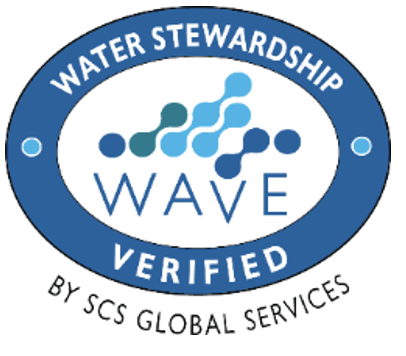Why it matters
Water is an essential input to our operations, especially in mining and fertilizer production, and waterways are a crucial natural infrastructure asset for transport of our product to markets. As it is a shared resource, it is important for Nutrien and our growers to use water efficiently and protect water quality, helping to maintain positive environmental impacts and ensuring long-term operational stability and viability. Agriculture is also highly dependent on water, but localized challenges exist regarding availability and quality, which can vary significantly by region, and are often intensified by the effects of climate change.
Our water stewardship work supports the following United Nations Sustainable Development Goals
 |
 |
 |
Our approach
Nutrien’s water stewardship actions are guided by our Safety, Health and Enviornment Policy and international best practices and guidance, such as the Alliance for Water Stewardship (“AWS”) International Water Stewardship Standard. Nutrien’s Water Strategic Issue Team (“W-SIT”) provides cross-functional subject matter expertise and a platform for transparent communication and strategic guidance throughout the Company. The W-SIT’s objectives are to review Nutrien’s water footprint, identify water-related risks and opportunities across our value chain, and develop context-based water targets that are most relevant and impactful to our business and the environment.
We take a watershed perspective across our operations to help us look outside our operational boundaries and understand the many environmental and social aspects of the watersheds in which we operate. Communities with whom our operations share watersheds rely on access to sufficient quantities of clean water for health, quality of life, economic well‐being and local environmental preservation. Nutrien is committed to working collaboratively to address shared water‐related challenges and opportunities. We support water stewardship in agriculture, starting at the farm field, through use of practices, products and digital tools that support sustainable agriculture and water stewardship in the entire agri-food value chain.
WAVE: Water Stewardship Verified
Nutrien is certified to The Water Council’s WAVE (Water Stewardship Verified) program. Nutrien has assessed water-related risk across the Company, identified the highest water-related impacts using credible water-related data and implemented best practice in improving water stewardship performance. In 2022, Nutrien became one of the first companies to achieve external verification for the WAVE program.

Our Actions
- In our operations Our primary uses of water in our operations are for producing nutrients, such as milling in mining operations, steam generation, and process cooling at our fertilizer production facilities. Water is also used to produce some of our liquid products. Nutrien’s operational water stewardship activities focus on reducing freshwater use, increasing the amount of water we recycle, and protecting water quality in our watersheds.
- In the agri-food value chain Nutrien is working collaboratively to address shared water-related challenges and opportunities. Throughout Nutrien’s extensive retail network, our agronomists and field experts promote agricultural management practices that meet the needs of the farm and make sense for the region in which they operate.
